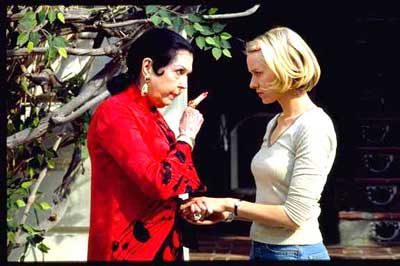David Lynch is among the privileged few American directors who has an unmistakable vision and the opportunity and integrity to indulge it for the past twenty odd years. His record has been spotty. His weird and distinctive (but meaningless) Eraserhead was followed by the not nearly weird and distinctive enough (but equally meaningless) The Elephant Man. For that he was rewarded with and Oscar nomination and a plum assignment, which ultimately became the lunatic Dune. I love Dune and try to catch at least part of it whenever it plays on the Sci-Fi channel. No idea what it is about--worms, spice, blowing stuff up by yelling at it. Or something. It doesn't matter.
Which is not so much the problem as the primary characteristic of Lynch's movies. They are more focused on concepts (ie, "malaise") than story, imagery (grotesque floating fat men) more than plot points. As a result, they have a private, almost hermetic feel; they are involving, but only kind of. Until Mulholland Dr.
Mulholland Dr. began as a television pilot. When support from the networks evaporated, Lynch refigured the work as a feature film. As a result, characters appear without a proper introduction and disappear without explanation. Scenes are disjointed and marked by radical shifts in tone. This would make it no more than a typical David Lynch production were it not imbued with a sympathetic spirit unique in his kinky, flaky, oeuvre.
The story, such as it is, records the rapidly disintegrating fantasy world of a woman occasionally known as Diane Selwyn. When she makes her first appearance, she has re-cast herself as would-be starlet Betty Elms, who immigrated to Los Angeles from Canada, deplaned, and then takes the down escalator to the street, flanked by a kindly old couple. She meets an amnesiac who lost her memory tumbling down a steep hill bordered by Mulholland Drive after a car accident. The young woman calls herself "Rita" after looking at a poster from the movie Gilda. Both physically descend in to the realm of the Hollywood dream factory, marked by shifting identities and lies. They don wigs and dress up--they are part actress, part spy, but mostly engaged in a girlish romp. When Rita helps Betty prepare for an audition, the scene plays as the banal protests of an outraged ingenue. ("That was really good," Rita marvels.) Performing the samescene in the presence of a cheesy has-been actor and sleazy never-will-be director, Betty is transformed into a supple femme fatale. Judged too talented for the room by an alert casting director, Betty is whisked away to another set. There, the star making part that should have been hers is bestowed upon somebody with less ability, but mysterious and powerful sponsors.

In
Costume and in Character (Naomi
Watts & Laura Harring in Mulholland Dr.)

A Warning from Someone Who's Been There (Ann Miller (!) and
Naomi Watts in Mulholland Dr.)
As my astute cousin Evelyn pointed out, this event is the turning point of the fantasy. Even in her own imagination, Betty/ Diane cannot conjure a happy ending. The starlet implodes, and Mulholland Dr. marks the metaphorical event horizon of the resulting black hole. Characters are inexorably drawn into and crushed by blackness and despair. The nice elderly couple is reformed into cackling homunculi, an intuitive young man is utterly destroyed.
David Lynch's movies have drowned in glamour for years. Women possessed of a nearly supernatural beauty have capsized narrative after narrative in their wake. The presence of the ultra-glamorous young women of Twin Peaks, for instance, was so improbable--even unnatural--that a corresponding ugliness had to be summoned into existence to restore balance to the world. But where Twin Peaks devolved into labyrinthine and cynical plotting, Mulholland Dr. takes the manufacture and consequences of glamour as its pure subject. Diane is twisted and demoralized in the effort it takes for her to create Betty; but even the pretty, plucky Betty is easily commodified and discarded. Hollywood is the only logical setting for this drama. Nowhere else is beautiful artifice so co-dependant with degradation. Legions of hopeful and disappointed working girls are the necessary fields from which a very few movie stars are plucked. And like Lily Bart, Betty/ Diane is not destined to ascend.
Cast
Away
The
House of Mirth
Ghost
World
AI:
Artificial Intelligence
Angel
Eyes
Introduction
Back
to Cobra Movies
(Written by Sharon C. McGovern)